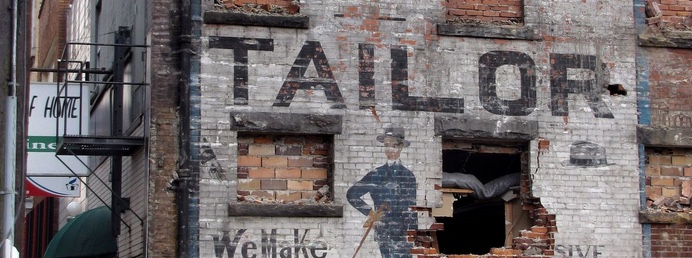The Bundhaus was not easily accessible. A few hours drive outside of Slakterquay, the journey took one from highway, to county road, to access road to, finally, a dirt road that led deep into the thick woods that surrounded the city. It was lovely, dark and deep forest, untouched by the logging that had helped build the city, leaving it quiet and pristine in its beauty.
Which would have been idyllic, except Aggie McPherson hated the outdoors, didn’t drive, and wasn’t looking forward to the appointment. Watching it from the second-story veranda of the Bundhaus, Haddo Skull could discern all of these things. Stepping out from the taxi, the detective carefully placed a well-polished shoe onto the wet gravel of the drive. Standing to full height, Aggie was short, narrow in shoulders and hips enough to be of indeterminate gender, the impression of which was only heightened by black spiky hair. Buttoning the jacket of a bespoke suit, the detective examined the surroundings, expression neutral until it fell on the house itself. Through his opera glasses, Haddo could see her expression curdle.
The well-tailored gray suit, to Haddo’s eye, was cut for a man, or perhaps a tall youth, and didn’t align with what Haddo thought a woman should wear. Particularly not a professional, as women had a limited number of functions. And this detective, he knew from investigations both mystic and mundane, straddled all of the domains meant for man and woman and perhaps more.
In fact, he hated the detective and all of her kind. However, he had need for her now.
On this rare occasion Bundhaus was empty, its front doors left open to the damp spring Pacific air. With the taxi idling in the drive, the detective strode in through massive wooden front doors and into the vestibule. On the floorboards that had been hewn from the virgin forest, she stopped, placed her hands in her pockets and waited.
Haddo gave McPherson several minutes in the entryway, waiting to see if her curiosity would get the better of her. However, she remained unmoved, alert just within the Bundhaus’ threshold.
The hall of the Bundhaus was two-stories and long, stretching the entire length of the wooden structure. It was dotted with doors on either side till it ended at a stage, flanked by red banners with silver shields. Normally, that was where Haddo would descend to meet the Legionnaires, to take the pulpit and speak to them about saving America from the mongrel hoard that beset her shores, to preach of the great destiny of Columbia.
However, when McPherson didn’t move, it necessitated Haddo take one of the two staircases that flanked the vestibule. His movements were no longer as swift as they once were and he would not suffer the indignity of hobbling down the long hall to meet her.
Normally, Haddo would be dressed in the ceremonial robes of his station, but doing so would only affirm too many of Aggie’s prejudices. So today Haddo had dressed in one of his finer suits he always wore for important auslanders. As he descended the stairs he was rather annoyed that, aside from the Mandarin collar on the detective’s suit, the two wore similar outfits.
It was not until his foot left the final step to touch the floor of the entryway that Aggie McPherson turned to meet his gaze. Her professionalism kept her face expressionless, but he could see contempt in those violet eyes. Her tone was neutral when she pronounced his name. “Haddo Skull.” She looked around him as if he were flanked by invisible guards. “Where are your brown shirts?”
Haddo felt his own contempt pull at the edge’s of his mouth, but provided a restrained reply of, “The men who dedicate their lives to the Legion are called Silver Shields.”
Aggie eyed the red banners at the end of the hall, then back to Haddo. “You say tomato, I say Nazi.
“What am I doing here Haddo?”
“I have need of your services. Although, honestly, it took me some time to discern what those services are.” Even in his advanced age, Haddo towered over Aggie and so stepped closer. “Your office door may say Spectral Analyst but you reputation sprawls beyond mere specters. Exorcist? Fixer? Demonologist? Private investigator?” He added an extra dollop of sarcasm onto the last rubric, “Hero?”
Aggie gave him the scornful frown Haddo had been waiting for all along. Instead of rising to that, though, she replied, “How about you just call me detective?”
“I believe you prefer to be called Aggie.”
“You can call me McPherson.”
“Well, Ms. McPherson — “
“Just McPherson. Or detective. Take your pick.”
That stopped Haddo. He was prepared to deal with this person, whatever she might be, but he could only tolerate so much presumptuousness from this untermensch. He felt compelled to remind her, “You clearly know who I am. And yet you come here unarmed, unescorted and display such rudeness. The last makes the first two unwise.”
Aggie matched Haddo’s step towards her, seeming to grow taller as she did. “I’m not afraid of you.”
“Then you are a foolish woman indeed.”
Aggie stared up at him. “Haddo, what I am is not something I’m here to learn from you.” With a briskness that caused her brightly lacquered nails to leave trails in the dim air of the vestibule, McPherson pulled a small card from her blazer pocket. “You invited me here. What do you want?”
Haddo took the card from her, inspecting it as a conductor might a train ticket. Truth was, he simply didn’t want anyone else to ever see it. He knew it read:
Please come to the Bundhaus Estate on March 19 at 08:00. Grandmaster Haddo wishes to discuss an important matter of border science and its impact upon his health. You will be compensated for your time.
While Haddo disappeared the invitation into his breast pocket, McPherson said, “Border science. That’s not a term that’s been popular since the days of Hans Bender. And since I don’t think your old enough to have been kicking around with the sturmabteilung, I think you must be using it as code for something. Something you don’t want your silver shield buddies to know about.”
Haddo felt himself bridle at having his motives so easily deduced. He kept a chain on that beast, though, saving it for later. Instead, he turned his back on his guest and returned to the stairs. “If you want to know the answer, come this way.” He was very pleased when he heard McPherson follow him.
He led her to his office, softly illuminated by the balcony windows through which he had observed her. Tired of pretending his legs didn’t hurt, he sat down at the massive and ancient cedar desk. From behind its vast expanse he saw see the detective already waiting, examining the vitrine of keepsakes and curios that sat between the two windows of his balcony.
Haddo waited a long time for her to prompt him, but she said nothing. He wondered if she was always this patient. It was that or she had reasoned out that it was a matter of time until a Silver Shield returned. After what had happened with that idiot Cordell, that wouldn’t do. So, reluctantly Haddo began. “There is a Revenant seeking to throw me down into perdition.”
Without turning from his trophies, Aggie interrupted with a, “Oof. Tough luck. Those things are nasty.” Haddo was pleased that she demonstrated the required knowledge of what a revenant was and simultaneously annoyed at her having waited so long only to interject with something so pointless. At least, he reasoned, she wasn’t touching anything.
He continued, “It comes at me from the east, but slowly. Its movement is governed by something, but I know not what. Perhaps the sun or the moon.”
Aggie faced him, standing between the light streaming through the two windows. “How do you know this?”
“I have my means.”
“Then why can’t you deal with it yourself? Why call me?”
“It –” Haddo paused, uncomfortable in admitting weakness to this thing. He had come this far, though. “It is beyond my sight.”
“Then its cause is just. No one wants to come back as a revenant, Haddo. Most times it happens it’s ’cause an adept has some kind of conditional invocation prepared.” Aggie paused, then, “You murder any fellow cultists lately?”
“No.”
“Then someone summoned this thing from beyond the grave and has the power to hide it from you. Which is impressive on both counts as trying to hide the necromantic energy needed to summon a revenant is like trying to hide a forest fire under a lampshade.”
“Yes.”
“So you offended a very powerful individual. Or daeva or daimon. Or god. Or, you know, God.”
“Are you suggesting my crusade against the heathen has angered God himself?
“The Christian God? I don’t know. I’ve never spoken to Him. But He did tell Moses, “You shall have no other gods before Me.” That doesn’t preclude the existence of other gods. Quite the opposite. Take my word for it.”
Haddo silently added heathen and blasphemer to the list of sins of his guest. Instead of speaking to that, though, he replied, “So now you know why I requested your presence.”
McPherson broke from the case she had been observing and smoothly moved into one of the two leather chairs that faced Haddo’s desk, draping arms from it. “Haddo, why would I help you?”
“Presumably, for money.”
“Everybody’s gotta pay the rent, sure. But why would I risk tainting my own soul with whatever you’ve done to bring this Revenant down on you?”
Haddo had expected this. But self-righteousness could be so easily redirected. “That church on King Street that you’ve shown an interest in? The one with the half-breeds, perverts, and heretics?”
The hardening in Aggie’s eyes told him he had hit his mark. “If you’re referring to Reverend Taggart’s church, I know it.”
“Help me with this and I’ll have the Legion leave that pathetic rabble alone.”
McPherson tilted her head at Haddo as if examining something under a microscope that was particularly stupid. “Taggart is a loup-garou. He could tear you and your little nazi clubhouse into bits.”
“If he was going to, he would have done it by now.”
“You willing to bet on that?”
Haddo smiled at McPherson. “The question is, are you?”
McPherson straightened up in her chair, examining Haddo anew. Haddo didn’t like it, but he held his smile. The sun moved along his office carpet before she quickly stood, belying the lax position she had been in. Haddo felt something vibrate in the air, but this resolved when McPherson broke eye contact to button her jacket. “I’ll do it. On three conditions.”
Haddo’s grin grew broader. “What would those be?”
“First, you do as you say and keep your filthy little machinations away from the Taggart’s church.”
“Of course.”
“If I so much as catch wind of you near that place, I’ll find this Revenant and point it right at you.”
Haddo nodded, conceding he would not want this. “And?”
“There’s a condo in LoDo. You’re going to buy it for me.”
Haddo wasn’t expecting this. “Property in Lower Downtown? That’s — “
“Outrageously expensive. And I don’t want you to give me the cash value. I want you to buy the condo. In your own name. Then I want you to sign it over to me.” McPherson stepped through the light to stand across from Haddo’s desk. “No shell companies, no financial chicanery. A straight transfer from you to me, in black and white.”
“I see,” Haddo replied and he did. The transfer would be both payment and insurance policy. He eyed this violet-eyed imp, mapping out the contingencies and blackmail that she was planning by placing these conditions. “And if I agree?”
“Then I find out the Revenant’s story. Every revenant has one and it’s the key to determining how to call it off.” McPherson shrugged, her elegant suit making the slightest of noises as the jacket of the smooth material moved. “Or I go home. Your call.”
Haddo considered this and successfully kept the smile from his face. If this imp thought a piece of paper sharing their names would be enough to break his hold over the Legion, then she greatly underestimated his power. To agree too quickly, though, would be to reveal too much, so he frowned and pushed a pencil across the ink blotter on his desk. Birdsong could be heard from the forest before he said, “Very well. I agree to your terms.”
“OK.” McPherson didn’t move to shake his hand, but put them in her pockets. “Well, you’d better get on buying that condo. I don’t start work until it’s in my name and I’d imagine that’ll take some time.” She hadn’t before, but McPherson smiled now. “And I don’t think you’ve got a lot of time left.”
“Very well.” Haddo rose. “Our business is concluded. Please leave the way you came. I thank you for coming all this way.”
Perplexing Haddo, McPherson’s smile grew broader. “That’s OK. This is a lot more interesting than I thought it would be.” Turning her back on him, she headed towards the door, pointing to his vitrine as she did. “When you brought me in here, I assumed it was to find out whoever stole your whachamacallit.”
Haddo blinked, stopping her with a, “Excuse me?”
McPherson’s smile peeked over her shoulder as did the twinkle in her eye. “The missing item in your little trophy case.” She strode over to the vitrine and pointed to the crushed velvet underneath the glass. Between the ceremonial dagger and brass skull, among the Records of Thule and the grotesque fertility sculpture, lie an outline of something long and thin that had once occupied space in the cabinet.
Perplexed beyond control, Haddo stood and moved to the vitrine, quickly confirming what his imp told him. Staring at the red velvet with its outline of his missing item, he found the words wanting to come out of his mouth to be too revealing. Unwilling to embarrass himself any further, he simply stood there. He found his control tested as McPherson added with barely concealed glee, “What? You didn’t know it was gone?” After a few moments of silence that Haddo could feel the detective savoring, she added, “I would have thought the first edition of Uralt Blut Boden Weisheit was the most valuable thing in here. What was taken?”
Haddo stood up straight and smoothed his ties and jacket that had become disheveled in his mad hobble over to the case. “Something I lent to an associate. Nothing you need to concern yourself over.”
“You sure?” McPherson cocked a plucked and incredulous eyebrow at him. “If I’m going to investigate your Revenant, I don’t want any surprises.”
“Yes.” Haddo gathered his dignity and began to move back to his desk. “I believe this concludes our business. You may go.”
Aggie shrugged, stuffed her hands back into her pockets, and walked towards the door. Haddo tried not to let the jaunty tune she was whistling bother him much.
See the author’s published work here.
Read More »
























